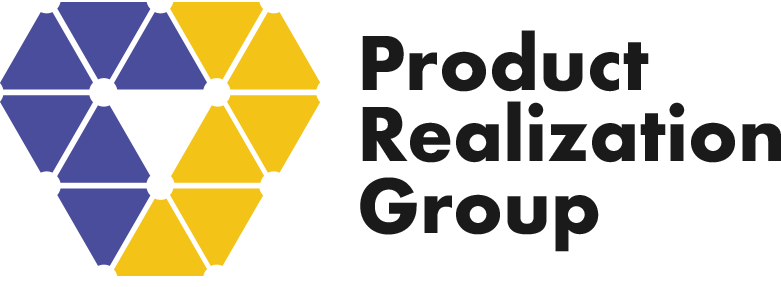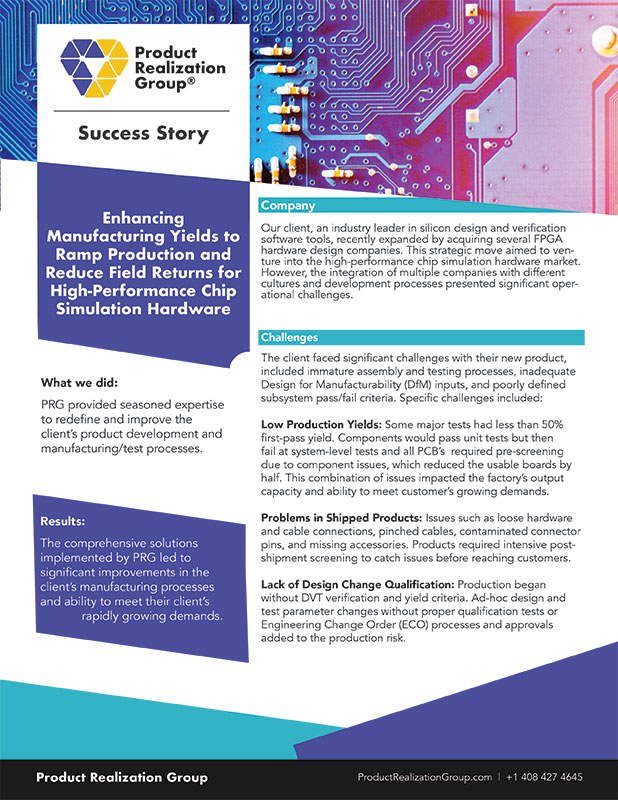
Client Background:
Our client, an industry leader in silicon design and verification software tools, recently expanded by acquiring several FPGA hardware design companies. This strategic move aimed to venture into the high-performance chip simulation hardware market. However, the integration of multiple companies with different cultures and development processes presented significant operational challenges.
Business Challenge
The client, with an engineering-centric culture and limited experience in manufacturing complex hardware systems, faced significant issues with their new product. Problems included immature assembly and testing processes, inadequate Design for Manufacturability (DfM) inputs, and poorly defined subsystem pass/fail criteria. As a result, products were introduced without comprehensive verification, leading to initial production yields of less than 50%. This impacted customer deliveries and increased product costs. Specific challenges included:
- Low Production Yields: Some major tests had less than 50% first-pass yield. Components would pass unit tests but then fail at system-level tests and all PCB’s required pre-screening due to component issues, which reduced the usable boards by half. This combination of issues impacted the factory’s output capacity and ability to meet customer’s growing demands.
- Problems in Shipped Products: Issues such as loose hardware and cable connections, pinched cables, contaminated connector pins, and missing accessories. Products required intensive post-shipment screening to catch issues before reaching customers.
- Lack of Design Change Qualification: Production began without DVT verification and yield criteria. Ad-hoc design and test parameter changes without proper qualification tests or Engineering Change Order (ECO) processes and approvals added to the production risk.
PRG Solutions
PRG provided seasoned expertise to redefine and improve the client’s product development and manufacturing/test processes. By mapping the manufacturing workflow, identifying critical issues, and implementing rigorous Engineering Verification Test (EVT), Design Verification Test ( DVT), and Production Verification Test (PVT) verification steps, PRG established robust downstream reviews and approvals, ensuring that products met high-quality standards before passing R&D Gate 1. Actions taken included:
- Production Yield Improvements: Mapped the manufacturing process flow and collected yield and test failure data at each station. Identified test stations with less than 50% yield and conducted root cause analysis as well as implemented design and test changes to align criteria and improve yields. Established a Corrective Action Process to resolve supplier quality issues.
- Quality Mitigation Strategy for Shipped Products: Implemented a process to identify and rectify quality issues before customer receipt. This included implementing a corrective action process with engineering, the factory and suppliers.
- Qualification Process for Design Changes: Formalized a change qualification processes to prevent ad-hoc updates. Executed qualification tests for design and component updates. Guided engineering and manufacturing teams to adopt Product Lifecycle Management (PLM) change control processes and established a Change Control Board (CCB) for approval of qualified design changes.
Client Benefits
The comprehensive solutions implemented by PRG led to significant improvements in the client’s manufacturing processes and ability to meet their client’s rapidly growing demands. These enhancements not only optimized in-process and final yields but also eliminated critical quality issues and boosted production capacity as follows:
- In-process and final yields improved to over 90%.
- Elimination of field failures negated the need for secondary screening.
- The factory was able to meet and substantially increase output capacity.
“Partnering with PRG has been transformative for both our development and manufacturing processes. Their expertise in streamlining production and implementing rigorous testing protocols significantly improved our yields and quality standards. We are now able to meet customer demands on-time and cost-effectively.”
— VP of Operations

 DOWNLOAD
DOWNLOAD
